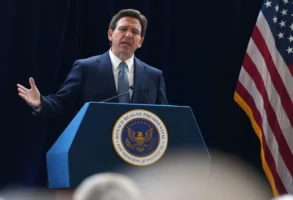
Published October 22, 2021
Critics of Texas Senate Bill 3, which prevents critical race theory–based indoctrination, continue to mischaracterize the law. In a new low, two historians, president of the American Historical Association, Jacqueline Jones, and executive director of the American Historical Association, James Grossman, go the usual misrepresentations one better by misquoting the text of the law. These historians and others make three key mistakes: 1) the law does not require the teaching of Holocaust denial; 2) the law does not prevent teaching that slavery was a crucially important aspect of American history; 3) the law does not prevent any teaching that makes students feel uncomfortable.
I am the author of model legislation that inspired some of the core language of Texas S.B. 3. To be clear, S.B. 3 reworks a similar law passed a few months previously, adding provisions that I have publicly and energetically opposed. That said, the particular provisions at issue here remain close to those offered in my model legislation.
The attack on S.B. 3 by historians Jones and Grossman is based on a misquote. According to Jones and Grossman, S.B. 3 “requires that K–12 teachers present ‘opposing viewpoints’ on ‘widely debated and controversial’ issues.” They go on to suggest that “historical issues” are best understood as having “different angles of vision,” rather than “opposing sides.” They warn that “we cannot, and should not, expect teachers to offer ‘opposing’ views on the essence of either slavery or genocide.”
Baseless attacks like this greatly misrepresent the text and meaning of S.B. 3 and continue to sow confusion about the law. First, the law does not demand the presentation of “opposing viewpoints” on “widely debated and controversial issues.” What S.B. 3 actually says is that a teacher “who chooses to discuss a particular current event or widely debated and currently controversial issue of public policy or social affairs” shall, “to the best of the teacher’s ability, strive to explore that topic from diverse and contending perspectives” (my emphasis).
This provision is specifically meant to apply to discussions of current events and widely debated public policy controversies in social-studies classes. Many social-studies teachers discuss current events in class. In fact, S.B. 3 actually requires them to do so. (That requirement is one of the provisions I oppose.) Clearly, current-events discussions in social-studies classes can shade over into one-sided treatments of hot-button controversies such as immigration, crime, federal spending, abortion, election laws, and a host of other issues. The new law merely indicates that in case of such discussions, teachers should strive to explore the topic from diverse and contending points of view.
Use of the word “strive” (i.e., “try”) is deliberate. This provision is largely aspirational. It sets a goal of balanced discussion of hot-button contemporary controversies, without dictating precise parameters for such discussion. Essentially, it calls on teachers to avoid abusing their authority by imbuing students with their personal political views.
Jones and Grossman omit the crucial text that makes all this clear. They put the words “widely debated and controversial” in quotes, which omits the crucial word “currently.” They also cut off the passage without including “issue of public policy or social affairs.” Their premise is that this provision of the law applies to “historical issues,” when the opposite is the case. S.B. 3 neither requires nor forbids the teaching of diverse and contending perspectives on the causes or consequences of, say, the War of 1812. This provision calls on teachers to explore diverse perspectives on widely debated current public policy controversies.
I haven’t seen any dueling newspaper op-eds or cable-television battles lately over either the reality or the horror of the Holocaust. The existence and horror of the Holocaust are the very opposite of widely debated and currently controversial issues. On the contrary, the Holocaust is an event from the past upon whose reality and horror there is wide social consensus. It is silly to claim that S.B. 3 requires the teaching of Holocaust denial when it does nothing of the sort.
Jones and Grossman also falsely claim that S.B. 3 prevents teachers from treating slavery and racism as “central aspects of our past, with a lasting impact.” That is not true. They object to the provision that prevents teachers from inculcating the idea that, “with respect to their relationship to American values, slavery and racism are anything other than deviations from, betrayals of, or failures to live up to, the authentic founding principles of the United States, which include liberty and equality.”
Nothing in that provision prevents teaching that slavery and racism are “central aspects of our past,” or that they have had “a lasting impact.” Certainly, our failures to live up to our founding principles have been centrally important to our history. What the provision cited by Jones and Grossman would prevent, and what it was designed to prevent, are claims such as those made by the 1619 Project, that our founding principles are a sham, that slavery is America’s true “origin,” and that out of slavery and racism “grew nearly everything that has truly made America exceptional.” The 1619 Project teaches that slavery and racism are America’s truest and deepest values and that our official founding story is essentially a pious fraud. Undoubtedly, some scholars agree with this. The people of Texas have every right to differ.
This brings us to the claim by Jones and Grossman that parents and administrators ought to accept the judgment of teachers who are “certified in pedagogy and age-appropriate instruction” and should adopt as well “a curriculum consistent with professional scholarship.” The notion that legislators ought to defer to teachers certified at education schools permeated by critical race theory is absurd, as is the idea that “professional scholarship” in today’s academy is free of political bias. (For more on the bias of the history profession and the curricula it generates, go here, here, and here.) S.B. 3 is a welcome sign that Americans have seen through false claims of neutral and professional scholarship and are finally pushing back against the bias of the academy.
Lastly, Jones and Grossman pick up on another common bogus attack on S.B. 3, although only briefly and implicitly. They suggest that the bill bars any teaching that causes student “discomfort.” That is false.
You can see a more elaborate version of this argument in this recent column from Michael Gerson. According to Gerson, the Texas bill forbids the teaching of “any ‘concept’ that causes an individual to ‘feel discomfort guilt, anguish, or any other form of psychological distress on account of the individual’s race or sex.’” Gerson leaves out critical language here. The law does not forbid teaching that causes discomfort on account of an individual’s race or sex. Instead, it forbids teaching that students ought to feel discomfort. To quote the text, the law prevents schools from inculcating the concept that “an individual should feel discomfort . . . on account of the individual’s race or sex.” This prevents teachers from telling students that they bear guilt or blame for, say, their so-called white privilege. It would not, however, prevent teachers from introducing the historical material floated in Gerson’s column, even if that made some students uncomfortable.
The absurd attacks on attempts by Texans to prevent indoctrination in the latest leftist nostrums continue. These attacks almost always mangle and misrepresent the actual text of the law in question. Parents need to stay strong in the face of false claims by biased academics, not to mention the Biden administration’s intimidation tactics. The battle against politicized education continues. Here’s hoping that the 2022 state legislative session will be a banner year.
Stanley Kurtz is a Senior Fellow at the Ethics and Public Policy Center.
Stanley Kurtz is a Senior Fellow at the Ethics and Public Policy Center. Beyond his work with Education and American Ideals, Mr. Kurtz is a key contributor to American public debates on a wide range of issues from K–12 and higher education reform, to the challenges of democratization abroad, to urban-suburban policies, to the shaping of the American left’s agenda. Mr. Kurtz has written on these and other issues for various journals, particularly National Review Online (where he is a contributing editor).





